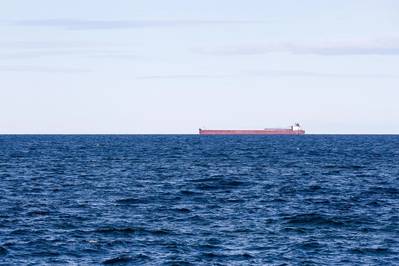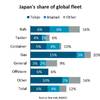US Probes Canadian Ballast Water Regulations After Shipping Companies Cry Foul
U.S. regulators are investigating potential unfair trade practices within pending Canadian regulations governing ballast water management systems of ships in the U.S.-Canada Great Lakes trade.
The Federal Maritime Commission (FMC) on Tuesday said it launched the probe to determine if the pending regulations have a disparate effect on U.S. flagged vessels and constitute a Foreign Shipping Practices violation under 46 U.S.C. Chapter 423.
U.S.-based companies operating ships in the U.S.-Canada Great Lakes trade maintain that Canadian regulations taking effect as to some vessels in September 2024 impose a severe burden on their operations and put American companies and vessels at a disadvantage relative to their Canadian competitors.
The new rules would require treatment equipment on American vessels loading ballast water in Canadian Great Lakes waters even when that water would be discharged in U.S. Great Lakes waters, overriding U.S. law and regulations set by the U.S. Environmental Protection Agency (EPA) and U.S. Coast Guard. The Canadian regulation would stop U.S. vessels from carrying U.S. exports to Canadian Great Lakes ports so that Canadian vessels would carry all of that cargo. The Canadian government provided a process for Canadian vessels calling on Canadian Great Lakes ports to obtain relief from the treatment requirement but did not provide U.S.-flag vessels serving Canadian Great Lakes ports a relief process to apply the Canadian regulations to U.S. Lakers so as to avoid the unlawful burdens the regulations would otherwise impose.
The FMC, an independent federal agency, said it has determined that sufficient facts exist related to the Canadian ballast water regulations to warrant initiating a Foreign Shipping Practices investigation. The probe will be led by the Commission’s General Counsel, who will prepare and present a report to the Commission containing his findings and recommendations for Commission action within 120 days, unless an extension is approved.
Leaders within the American Great Lakes shipping industry praised the FMC’s action, calling the Canadian proposal “the epitome of an unfair trade practice” that seems primarily designed to give Canadian vessels a practical monopoly on bi-national Great Lakes shipping.
“U.S.-flagged fleet of ships and sailors on the Great Lakes are grateful to the FMC Commissioners for taking a stand for U.S. workers,” said Jim Weakley, president of the Lake Carriers’ Association, representing U.S. Great Lakes shipping companies. “The proposed regulation is severely biased and shamefully uses a serious issue to impose a trade barrier and increase profits for Canadian companies at the expense of everyday Americans. This is not about protecting the environment; this is about economic manipulation.”
The Great Lakes Maritime Task Force, which represents nearly 80 U.S. entities across the Great Lakes and includes shipboard and shoreside labor, ports, facilities, and shipyards also praised the agency's action.
“If Transport Canada is allowed to regulate U.S. waters on the Great Lakes in favor of Canadian vessels, a precedent will be set that will forever damage the ability of U.S. workers to compete and will further erode the maritime industry in America,” stated Richard Hammer, general manager of DonJon Shipbuilding in Erie, Pennsylvania and president of the Great Lakes Maritime Task Force.
The FMC said there are are significant potential consequences for Canadian-flagged vessels calling at U.S. ports if a violation of the Foreign Shipping Practices provisions is found. Options for offsetting sanctions include limiting Canadian-flagged vessels from calling at U.S. ports and assessing significant fees on Canadian-flagged vessels.
Today’s announcement continues an ongoing examination by the Commission of Canadian government policies and regulations impacting U.S. flagged Great Lakes operators. A petition filed by the Lake Carriers’ Association (Petition P1-20) originally directed the Commission’s attention to this matter in March 2020. Subsequently, the Commission initiated an Investigation of Regulations Affecting Shipping in Foreign Trade using its authority under 46 U.S.C. Chapter 421.
A similar inquiry by the FMC in 2005 resulted in the Government of Canada charging U.S.-flag Lakers the same amount for the Canadian Navigation Services Fee that they charged Canadian-flag Lakers. From 1997 – 2005, American vessels paid a significantly higher amount to the Canadian Government for no additional services. That higher fee impacted freight rates and drove cargo to Canadian vessels.














